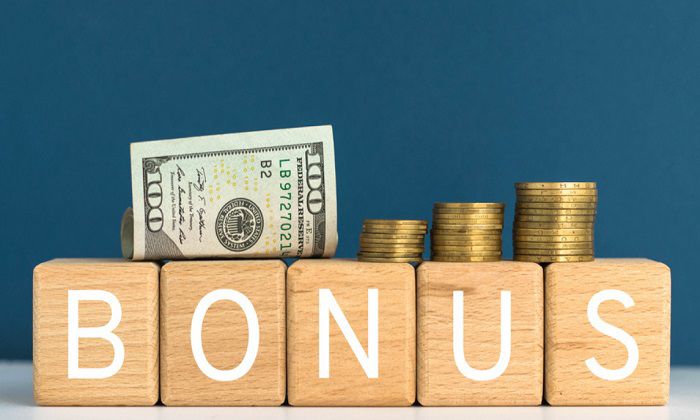Forex bonus can be a great option to increase your income from your trades, but can you use it to trade with leverage? What are the benefits and risks of doing so?
The forex market is large enough to offer various investment opportunities for millions of traders from all around the world. In recent years, an overwhelming number of forex brokers and firms began to emerge, making it harder for traders to choose where to register and invest their cash in. Apart from the obvious matters like safety and cost, forex bonuses are also something that cannot be ignored. Surely everyone is attracted to extra money, so many traders are attracted to apply for it.

Now when it comes to the actual practice of forex trading, many traders like to use leverage in order to increase their position sizes and aim for larger returns. However, leveraged trading is often said to be a double-edged sword due to its high risk, high return nature. This is why traders need to be really careful and precise when trading with leverage.
Interestingly, forex bonuses can actually affect the weight of leveraged trading in one way or another. Thus, it's important to understand how each of them works and how to combine the two concepts in order to reach the best possible outcome.
Contents
Types of Forex Bonuses
After registering with a certain broker, a trader will be able to buy and sell currency pairs and enjoy various trading features that the broker offers. Additionally, the broker may give the trader rewards or bonuses as a way of thanking them for being an active trader or simply for choosing the broker. This allows them to improve their trades and have a bigger buying power in the market.
Each forex broker typically has its own rules and conditions regarding forex bonuses, but in general, we can categorize forex bonuses into two common types, namely:
Deposit Bonus
Deposit bonus is arguably the most common type of broker promotional incentive that brokers usually use to attract new users. The idea is to reward traders for making a deposit and entrust their capital to the broker. The amount could be predetermined or based on the percentage of the total deposit. It can be around 20-50% depending on the broker and the promotion at the time.
The bonus is usually given for the very first deposit a user makes as a welcome bonus. That being said, this kind of bonus is a one-time deal and it's limited to new users only. But apart from that, there are brokers that give deposit bonuses every time a customer makes a deposit in their trading account, but the amount is usually smaller than welcome bonuses. This is typically used to encourage users to make deposits more often.
Registering in brokers that offer reload bonuses can be a great advantage since it enables traders to enhance their amount of trading capital and even open a new position with additional cash. Although the amount is usually small, it can still be useful as it can help them grow the size of their balance if they make deposits often enough.
No Deposit Bonus
In contrast, no deposit bonus is given with no additional cost at all, so traders don't need to deposit beforehand. In most cases, these bonuses are offered as a way to attract new clients and give them the opportunity to learn how to trade without having to deposit any money. To get a no deposit bonus, you're only required to create a trading account in a broker.
Traders with higher trading expertise can benefit greatly from this type of forex bonus because they can use it for various different purposes. For instance, they can use the additional cash to test out new methods and strategies without putting their live accounts at risk. On the other hand, new traders can also use the cash to open their first trade without spending any money.
It's worth mentioning that rewards from no deposit bonuses are tradable but they are certainly not free money that can be withdrawn immediately. Therefore, you need to be able to use it wisely to get maximum advantage. Also, make sure to read the broker's terms and conditions before using the bonus.
Using Leverage in Forex Trading
Leverage is one method that you can use to generate more income. The idea is basically to borrow money from the broker by putting some money as collateral and simply use the borrowed cash to trade.
As a result, you can increase the size of your position so that you have a bigger chance of getting more profit. This is particularly useful when the market is highly profitable, but it is also risky because you're trading with much more money than you can afford. If the price moves against you, you'll lose much quicker. For that reason, many brokers typically limit the amount of leverage that users can get to minimize the risk of extreme loss. It can be based on the user's expertise or the amount of collateral, but usually, leverage in the forex markets can go as high as 1:100.
How Forex Bonus Affects Leverage
As mentioned above, forex bonuses can increase the amount of money in the trader's account balance. Therefore, traders can also increase the amount of leverage that they can get. This can be a huge benefit for the trader compared to increasing leverage manually.
Let's say you have $1,000 in your account balance. Since the maximum leverage is 1:100, then for every $1,000 in your account, you can trade up to $100,000 in value. Now if you receive some bonus from your broker and end up increasing your balance to $2,000, then that means you will be allowed to open a position of up to $200,000 in size. The best thing about this is that while you can increase the leverage as well as potential profit, you won't necessarily increase the risk of loss since the extra money is awarded to you by the broker.
Moreover, you can adjust the leverage as much as you want according to your needs. The smaller the real leverage you apply to the trade, the less worry you will have. It will give you more breathing room and allow you to explore further. For instance, you can set the stop loss a little wider or you can try different methods. But even so, don't be reckless and trade with greed. Keep in mind that trading with high leverage is always risky, regardless of whether you use bonus money or not.
Final Thoughts
Forex bonuses are certainly attractive to any trader because they can be allocated in many different things, including leveraged trading. You can use the bonus money to boost your leverage ratio and increase the size of your position without increasing the actual risk of loss on your initial deposit.
However, even though you won't be increasing your risk of loss to your own capital, a loss is still a loss. Surely you don't want to lose the opportunity to gain more profit from the bonus money, right? This is why if you decide to use your bonus money to increase your leverage, it's important to learn how to manage and control your leveraged trades in general. The best way to approach this is to think of it as a regular leveraged trade that you usually execute with your own capital. This way, you won't underestimate the trade and you will have a bigger chance to win and earn significant profits.
Last but not least, it's important to understand that leveraged trading is considered a high-risk investment, so it's generally more suitable for traders with more knowledge and experience. Remember that the higher the leverage, the higher the risk. So if you're a beginner, high leveraged trading is usually not recommended. But if you really want to, you can practice on a demo account before investing real money or you can just use the bonus money to test out your strategy. Do not trade and risk more money than you can afford, so make sure to think carefully before making any move.

 Dedicated FREE FOREX VPS
Dedicated FREE FOREX VPS Free FOREX Virtual Private Server
Free FOREX Virtual Private Server MT4 Demo Contest, Get $500
MT4 Demo Contest, Get $500 Sign Up for an Account, Claim 60% Deposit Bonus
Sign Up for an Account, Claim 60% Deposit Bonus Free MT4/MT5 VPS 2024
Free MT4/MT5 VPS 2024 Send E-mail and Get Free Merchandise
Send E-mail and Get Free Merchandise $1K Refer a Friend Bonus for Pepperstone Pro clients
$1K Refer a Friend Bonus for Pepperstone Pro clients Maximize Your Earnings with 100% Deposit bonus
Maximize Your Earnings with 100% Deposit bonus Trade to Win, $5,000 Monthly Demo Contest
Trade to Win, $5,000 Monthly Demo Contest Claim 30% + 15% Deposit Bonus from LiteFinance
Claim 30% + 15% Deposit Bonus from LiteFinance















